Five Books about Physics That Stood Out in 2018
Spring
2019
Feature
Five Books about Physics That Stood Out in 2018
Melinda Baldwin, Senior Editor, Physics Today
Every month Physics Today prints reviews of new books on the physical sciences. As the lucky person who gets to sort through the incoming books and then edit the reviews, I read a lot of fantastic stories about science and the people behind it. Here are five books that got rave reviews in the pages of Physics Today last year. I’ve also included five bonus picks from our New Books & Media column, which covers not just books but films, podcasts, software, television series, and more.
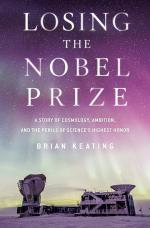 Losing the Nobel Prize: A Story of Cosmology, Ambition, and the Perils of Science’s Highest Honor by Brian Keating (W. W. Norton, 2018, $27.95). In March 2014, a team working on the BICEP2 telescope announced the detection of a polarization signature consistent with primordial gravitational waves. Newspapers and magazines around the world covered what seemed to be confirmation of cosmic inflation, and a video of BICEP2 scientist Chao-Lin Kuo surprising theorist Andrei Linde with news of the discovery went viral. But within a year it became clear that BICEP2’s signal had been caused not by gravitational waves but by cosmic dust. In Losing the Nobel Prize, BICEP2 collaborator Brian Keating reflects on what went wrong. He contends that the BICEP2 team rushed its announcement in its eagerness for the coveted Nobel, a prize that harms science, he asserts, by encouraging cutthroat competition and an urgency to claim credit. Cosmologist Lloyd Knox said the book is “a compelling personal memoir, a fascinating history of cosmology, and an interesting firsthand account of a dramatic scientific adventure.”
Losing the Nobel Prize: A Story of Cosmology, Ambition, and the Perils of Science’s Highest Honor by Brian Keating (W. W. Norton, 2018, $27.95). In March 2014, a team working on the BICEP2 telescope announced the detection of a polarization signature consistent with primordial gravitational waves. Newspapers and magazines around the world covered what seemed to be confirmation of cosmic inflation, and a video of BICEP2 scientist Chao-Lin Kuo surprising theorist Andrei Linde with news of the discovery went viral. But within a year it became clear that BICEP2’s signal had been caused not by gravitational waves but by cosmic dust. In Losing the Nobel Prize, BICEP2 collaborator Brian Keating reflects on what went wrong. He contends that the BICEP2 team rushed its announcement in its eagerness for the coveted Nobel, a prize that harms science, he asserts, by encouraging cutthroat competition and an urgency to claim credit. Cosmologist Lloyd Knox said the book is “a compelling personal memoir, a fascinating history of cosmology, and an interesting firsthand account of a dramatic scientific adventure.”
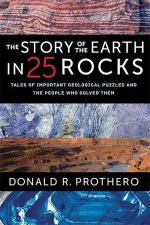 The Story of the Earth in 25 Rocks: Tales of Important Geological Puzzles and the People Who Solved Them by Donald Prothero (Columbia Univ. Press, 2018, $35.00). Geologist and paleontologist Donald Prothero looks back at the history of his discipline through 25 short essays about famous geological puzzles. Prothero tackles continental drift, the origins of volcanoes, the cycles of ice ages, and more in his chapters, focusing on moments when unexpected or unexplained findings raised new questions that led to breakthroughs. He also calls attention to both well-known geologists like Charles Lyell and ones who are more often overlooked, such as former janitor James Croll. Earth scientist Michael Manga called the book “engrossing” and recommended it “to anyone interested in tales of scientific discovery and natural marvels.”
The Story of the Earth in 25 Rocks: Tales of Important Geological Puzzles and the People Who Solved Them by Donald Prothero (Columbia Univ. Press, 2018, $35.00). Geologist and paleontologist Donald Prothero looks back at the history of his discipline through 25 short essays about famous geological puzzles. Prothero tackles continental drift, the origins of volcanoes, the cycles of ice ages, and more in his chapters, focusing on moments when unexpected or unexplained findings raised new questions that led to breakthroughs. He also calls attention to both well-known geologists like Charles Lyell and ones who are more often overlooked, such as former janitor James Croll. Earth scientist Michael Manga called the book “engrossing” and recommended it “to anyone interested in tales of scientific discovery and natural marvels.”
 Making Contact: Jill Tarter and the Search for Extraterrestrial Intelligence by Sarah Scoles (Pegasus Books, 2017, $27.95). Science writer Sarah Scoles’s first book tells the story of Jill Tarter, an engineer and radio astronomer who has devoted her scientific career to SETI. Tarter, famously the inspiration for the main character in Carl Sagan’s novel Contact, has been an influential member of the SETI project since its earliest days. The lively biography follows Tarter from her days as a student at Cornell and into her pioneering career searching for signs of extraterrestrial life. Scoles, a longtime admirer of Tarter’s work, also highlights the way she has mentored and inspired female scientists. Shelley Wright praised Scoles’s skilled handling of both biographical and scientific details and said the book “will engage both amateur science enthusiasts and the most seasoned physicists.”
Making Contact: Jill Tarter and the Search for Extraterrestrial Intelligence by Sarah Scoles (Pegasus Books, 2017, $27.95). Science writer Sarah Scoles’s first book tells the story of Jill Tarter, an engineer and radio astronomer who has devoted her scientific career to SETI. Tarter, famously the inspiration for the main character in Carl Sagan’s novel Contact, has been an influential member of the SETI project since its earliest days. The lively biography follows Tarter from her days as a student at Cornell and into her pioneering career searching for signs of extraterrestrial life. Scoles, a longtime admirer of Tarter’s work, also highlights the way she has mentored and inspired female scientists. Shelley Wright praised Scoles’s skilled handling of both biographical and scientific details and said the book “will engage both amateur science enthusiasts and the most seasoned physicists.”
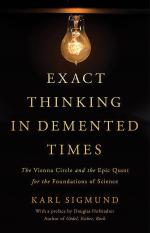 Exact Thinking in Demented Times: The Vienna Circle and the Epic Quest for the Foundations of Science by Karl Sigmund (Basic Books, 2017, $32.00). In his latest book, Viennese mathematician Karl Sigmund follows the lives and careers of the members of the Vienna Circle, a group of philosophers and physicists whose work underlies the modern philosophy of science. The group began its work in a Vienna that was one of Europe’s brightest intellectual centers, but the rising tide of European fascism and anti-Semitism would eventually disband it. Some members found new intellectual homes outside Austria; others met less congenial fates. Most tragically, founding member and leader Moritz Schlick was assassinated by a mentally ill former student; Nazi leaders praised the murderer for killing a “friend of the Jews.” Historian Don Howard expressed high praise for Sigmund’s book, calling it “serious and first-rate history—written like a novel.”
Exact Thinking in Demented Times: The Vienna Circle and the Epic Quest for the Foundations of Science by Karl Sigmund (Basic Books, 2017, $32.00). In his latest book, Viennese mathematician Karl Sigmund follows the lives and careers of the members of the Vienna Circle, a group of philosophers and physicists whose work underlies the modern philosophy of science. The group began its work in a Vienna that was one of Europe’s brightest intellectual centers, but the rising tide of European fascism and anti-Semitism would eventually disband it. Some members found new intellectual homes outside Austria; others met less congenial fates. Most tragically, founding member and leader Moritz Schlick was assassinated by a mentally ill former student; Nazi leaders praised the murderer for killing a “friend of the Jews.” Historian Don Howard expressed high praise for Sigmund’s book, calling it “serious and first-rate history—written like a novel.”
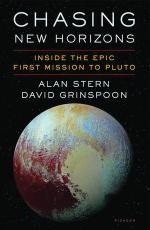 Chasing New Horizons: Inside the Epic First Mission to Pluto by Alan Stern and David Grinspoon (Picador, 2018, $28.00). The New Horizons spacecraft completed a flyby of Pluto in July 2015, sending back our first images of the ex-planet’s icy surface. In this engaging book about the mission, principal investigator Alan Stern and planetary scientist David Grinspoon chronicle the long efforts to launch a probe to Pluto. The book is accessible to general readers but also contains an appendix that describes the mission’s findings in enough scientific detail to engage seasoned planetary scientists. Astronomer Jim Bell said the book is “a comprehensive, entertaining, and educational story about the birth, glorious prime of life, and continuing adventures of a unique mission to the farthest realm of our solar system.”
Chasing New Horizons: Inside the Epic First Mission to Pluto by Alan Stern and David Grinspoon (Picador, 2018, $28.00). The New Horizons spacecraft completed a flyby of Pluto in July 2015, sending back our first images of the ex-planet’s icy surface. In this engaging book about the mission, principal investigator Alan Stern and planetary scientist David Grinspoon chronicle the long efforts to launch a probe to Pluto. The book is accessible to general readers but also contains an appendix that describes the mission’s findings in enough scientific detail to engage seasoned planetary scientists. Astronomer Jim Bell said the book is “a comprehensive, entertaining, and educational story about the birth, glorious prime of life, and continuing adventures of a unique mission to the farthest realm of our solar system.”
New Books & Media Picks
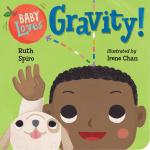 Baby Loves Gravity! by Ruth Spiro, with Irene Chan, illustrator (Charlesbridge Publishing, 2018, $8.99). For the smallest kids on your list, consider this colorful board book, which shows how gravity’s pull affects Earth’s movement around the Sun and a trip down a slide at the park.
Baby Loves Gravity! by Ruth Spiro, with Irene Chan, illustrator (Charlesbridge Publishing, 2018, $8.99). For the smallest kids on your list, consider this colorful board book, which shows how gravity’s pull affects Earth’s movement around the Sun and a trip down a slide at the park.
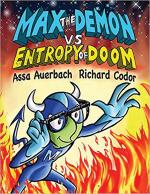 Max the Demon vs. Entropy of Doom by Assa Auerbach and Richard Codor (Loose Line Productions, 2017, $24.95 paperback). This innovative graphic novel aimed at middle and high school students follows nerdy superhero Max the Demon and his scientist friend Julie Calore as they try to fight climate change and develop alternative energy sources.
Max the Demon vs. Entropy of Doom by Assa Auerbach and Richard Codor (Loose Line Productions, 2017, $24.95 paperback). This innovative graphic novel aimed at middle and high school students follows nerdy superhero Max the Demon and his scientist friend Julie Calore as they try to fight climate change and develop alternative energy sources.
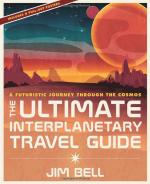 The Ultimate Interplanetary Travel Guide: A Futuristic Journey Through the Cosmos by Jim Bell (Sterling, 2018, $24.95). Astronomer Bell’s lively book imagines a future in which vacationers plan trips to solar system destinations such as Pluto and Europa.
The Ultimate Interplanetary Travel Guide: A Futuristic Journey Through the Cosmos by Jim Bell (Sterling, 2018, $24.95). Astronomer Bell’s lively book imagines a future in which vacationers plan trips to solar system destinations such as Pluto and Europa.
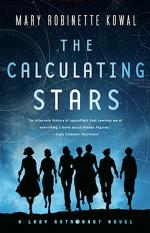 The Calculating Stars and The Fated Sky by Mary Robinette Kowal (Tor, 2018, $18.99 paperback/$15.99 paperback). This pair of novels explores an alternate history of spaceflight in which humanity races to escape the catastrophic consequences of an asteroid strike.
The Calculating Stars and The Fated Sky by Mary Robinette Kowal (Tor, 2018, $18.99 paperback/$15.99 paperback). This pair of novels explores an alternate history of spaceflight in which humanity races to escape the catastrophic consequences of an asteroid strike.
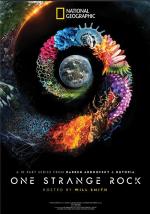 One Strange Rock (Nutopia, 2018, $29.95 DVD). The National Geographic Channel’s ten-episode miniseries combines stunning footage of unusual natural phenomena and insightful interviews with astronauts to explore the serendipity of life on Earth. Will Smith narrates.
One Strange Rock (Nutopia, 2018, $29.95 DVD). The National Geographic Channel’s ten-episode miniseries combines stunning footage of unusual natural phenomena and insightful interviews with astronauts to explore the serendipity of life on Earth. Will Smith narrates.
